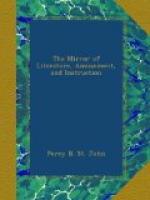“The Robin and the Wren
Are God Almighty’s cock and hen,”
says the old distich, and whilst it is reckoned wicked to kill either of these (not but that there is an ancient custom of “hunting the wren” still kept up, we believe, in some parts of this country,) it is considered unlucky to kill a Swallow, or House-Martin. The King-fisher is the Halcyon of the ancients, who imagined that during the process of incubation by the female the sea remained unvexed by storms; hence “halcyon days.” The feathers of this bird are employed by the Tartars for many superstitious purposes; they consider them amulets of priceless value, enabling them to inspire women with love. In more civilized countries it was once believed, that if the body of a kingfisher were suspended by a thread, some magnetic influence would turn its breast to the north: others thought it a preserver of woollen cloths from moths. The Albatross (by some considered the kingfisher or halcyon,) is fabled to sleep in the air, never to touch the earth; and to kill one is reckoned supremely unlucky. There is an Indian bird, the name of which has unfortunately escaped us, that is feigned to live only on the rain-drops which it can draw with its bill from the clouds; in a dry season, therefore, this bird perishes. Of the Bird of Paradise the following wonders were once credited: viz. that the egg was laid in the air by the female, and there hatched by the male in an orifice of his body; that it had no legs (these however are long, and a disfigurement to the body, which the Indians know, and fearful of their depreciating the value of the bird, upon capturing it, cut them off); that it hung itself by the two long feathers of its tail on a tree when sleeping; that it never touched the ground during any period of its existence, and fed wholly on dew. The Indians also believe that the leader, or king of the birds of paradise is black, with red spots, and that he soars far away from the rest of the flock, which, however, never quit him, but settle where he does. The Gigantic Crane is believed by the Indians to be invulnerable, and animated by the souls of deceased Brahmins; the Africans hold it in equal veneration. Whence arises the classical fable that swans sing their own dirge just previous to death, and expire singing it? The wild swan certainly may be said to whistle, but the tame has no other note than a hiss, and this only when provoked. The Kamschatdales and Kuriles wear round their necks the bills of Puffins, as an amulet which ensures good fortune. Who was Mother Carey?—The wife, perhaps, of “Davy,” and keeper of his “locker;” Mother Carey’s chickens is the well-known appellation, in tarrish tongue, of Stormy Petrels, not superstitiously supposed to forebode tempests, since they seem their very element; but it is probable that to Mother Carey herself (we crave her pardon—Mistress)




